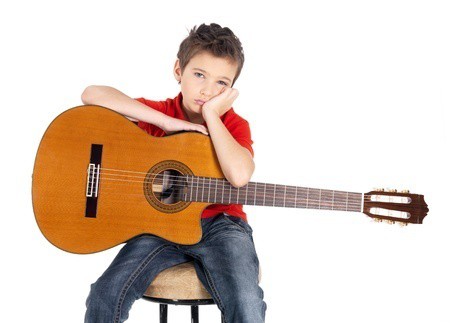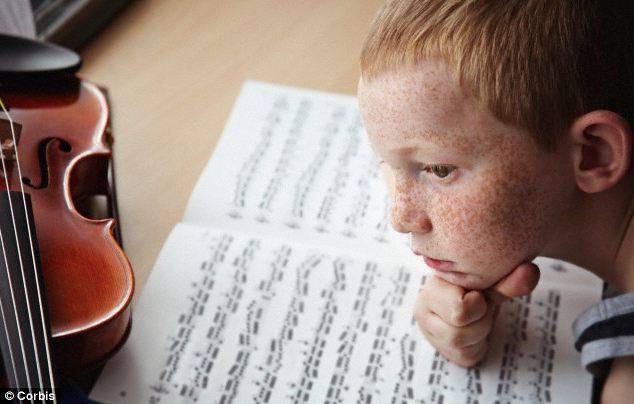Like most arts and subjects, learning and practicing music has its ebbs and flows. Whereas most kids find the idea of getting their hands on a guitar pretty alluring, they are not really geared up for the toil that the musical instrument demands before it agrees to obey the fingers and hands of the person playing it. The result, most kids quit music after a few forgettable months. There are dozens of reasons that explain why kids quit music, the primary ones being:
- Unbearable boredom out of routine practice sessions with excruciatingly slow improvement
- Impatient and unprofessional teachers that fail to keep the fire burning
- Parents who fail to support their kids during their tough times with the musical instrument
- Inability of students to manage time for music practice with many other activities to do
- Kids in the wrong music class – the other kid(s) are ahead of them which can discourage some kids since they feel they are not good and because the class is moving too fast for them.
Of course, some of these reasons deserve in-depth coverage; read on!

Making Kids Recognize the Indispensability of Learning Music
Imagine your kid telling you how he finds mathematics a bit too demanding, and wants to opt out of learning it. Would you let that happen? We suppose not (well some kids to give up on math in high school costing them a valuable job later on in life). On similar lines, parents need to acknowledge the massive physical, psychological, social, and emotional benefits that music lessons can bless your kids with.
It’s been scientifically proven that kids who learn music diligently during their childhood turn out to be sharper, socially appreciated, and physically more competent than their untrained counterparts. As parents, envisage music learning as a wholesome training focused on enhanced motor skills, better mental abilities, and unmatched social skills, for your child. With this in mind, you’ll know how to deal with your kids when they feel tempted to quit their music lessons.
When Parents Consider their Kids Musically Disadvantaged
More often than naught, your kid will not be able to play the melodies of your favorite Beatle songs on his guitar or piano. Does that mean the kid is not talented? Surprisingly, that’s the yardstick most parents use to measure their kids’ caliber with the music instrument.
It’s important for you to realize how tough learning music is, and how your kid could take several months before being able to play a complete song the way you want to hear it. The good part – as long as your kid is excited about music, and has the discipline to practice regularly, he will get better, and will be able to create some magic with his music at your family get-togethers and begin to learn at an early age that they can have success in front of others. They can also learn that they can impress other people based on something they worked on and did.

The Inevitable Summer’s Gap
The summer can make or break your kids’ future as musicians. Studies and research literature suggest how students who spend their summer holidays away from books often find themselves lagging behind their colleagues when classes resume. Similarly, your kid could end up losing the fruits of several months’ efforts just by taking it easy during the summer and not practicing the music instrument. Small gaps of non-practice have
Small gaps of non-practice have far-reaching impacts in terms of retention of music acumen. Pitch in, plan out a disciplined summer vacation schedule of music practice for your kid. Motivate them by giving them a musical learning goal to accomplish by the end of the summer holidays. It is not like they are not going to have plenty of time for other activities (playing with their friends) in the summer.
All Practice and No Play
A key factor of motivation and interest retention for kids learning music is the availability of platforms of performance. Without regular events where the kids can perform solo or as parts of bands, it can all seem like an endless grind for the kids. Teachers, as well as parents, can eliminate this cause of de-motivation by devising plans to have the kids perform and showcase their skills with music instruments. Whether it’s a month-end classroom event or a weekend talent show, ensure that the kids have something to look up to, something to motivate them to learn with vigor.

Final Words
Each of these reasons is real enough to be applicable to your child, but not valid enough to allow him to quit learning his favorite music instrument. By anticipating the challenges that kids face while learning music and music instruments, parents and teachers can be prepared to help them bear the ups and downs of their musical journeys.
Each of these reasons is real enough to be applicable to your child, but not valid enough to allow him to quit learning his favorite music instrument. By anticipating the challenges that kids face while learning music and music instruments, parents and teachers can be prepared to help them bear the ups and downs of their musical journeys.
- Is your kid looking to quit music because he’s not yet identified the right music instrument to learn?
- Is your kid too drained out in other activities like debate societies and karate classes to care enough for music?
- Do you need to enroll your kid in a better music academy? Does he want to be in the academy at all? Perhaps learning by themselves is better.
Asking yourself the right questions related to your kids’ early education in music and music instruments is sure to help the little boys and girls sail through the testing waters of music classes early on.
Featured Image: Image Credit
Homeschool Music Lessons: Let Them Quit or Force Them to Continue? | CurrClick Blog https://t.co/GdkyJkK30x #ihsnet #music #homeschool
— My Little Poppies (@caitfitz6) February 5, 2016
Why Your Child Should Take Music Lessons https://t.co/vJl5MOkfYT
— Kovitz Enterprises (@KESocial) February 8, 2016
Related Articles:
Who Actually Quits Musical Instrument Instruction — Children or Their Parents?
How many times have we heard from adults that they wish their parents didn’t allow them to quit their musical instrument when they were younger?
There comes a time in a large percentage of music students’ lives when they want to quit their instrument — and more often than not, parents allow them to do it. But is the child quitting … or is the parent?
I remember wanting to quit the trombone when I was in middle school. Honestly, it’s hard to remember why. Via Music Parents Guide
Should You Let Your Kid Quit Music Lessons?
A couple of days ago, Sophia had her very last violin lesson. Yes, you read that right. I let her quit music lessons after four years of sticking it out. It wasn’t an easy decision for me at all and I feel like a great big failure of a music mom. The Maestro is the one who actually finally convinced me that it was time to stop trying to make violin lessons work for her and move on. And as much as it pains me to admit it, he was right. Via Overstuffed Life
When kids want to quit
The first time my daughter said she wanted to quit the swim team, at age 8, I felt dumbfounded.
This is a child who has loved the water since her first YMCA swim class at 6 months of age, who cheers whole-heartedly for her teammates and who relishes the rare unfettered access to donuts and Ring Pops that summer swim meets provide. But when I gently shook her awake one Saturday morning, the first sound out of her mouth was a shriek of protest. Via Washington Post

